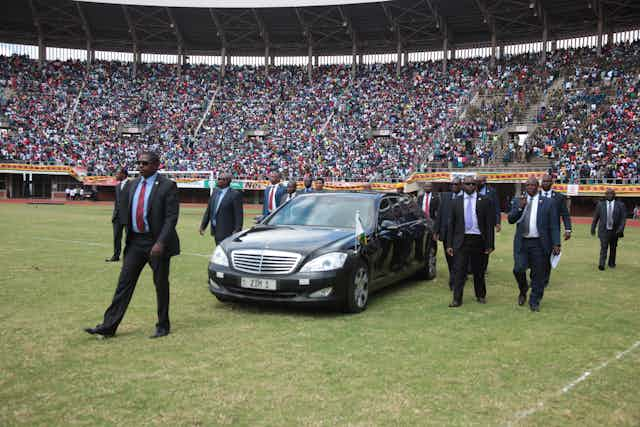I was in Zimbabwe when news came through of a clash of motorcades in neighbouring Zambia. One motorcade was carrying the president, Edgar Lungu, and the other the opposition leader, Hakainde Hichilema. It seemed neither would give way to the other. There is little love lost between the two men, and Hichilema still refuses to recognise Lungu’s contentious election victory last year – but even so, no one expected that shortly after the stand off, security forces would storm Hichilema’s home and teargas his family, then arrest him for treason.
If Lungu was behind this, it was the ultimate in road rage. It seemed at the very least unpresidential, and at worst deeply intolerant and paranoid – and indicative of a disturbingly authoritarian turn that’s not confined to Zambia.
Across southern Africa, the stakes are high for incumbent presidents, whose positions no longer seem so secure. Lungu’s contested 2016 victory came at a relatively thin 52%, unlike Zimbabwean counterpart Robert Mugabe’s even more disputed 2013 landslide triumph.
But in Zimbabwe, the plots and rumours of plots to succeed the increasingly frail president, either before or shortly after the 2018 elections, all point to the inevitability of an endgame to the elderly Mugabe’s life. And the feverish rumours about whose knife is in whose back all point to a sub-text of a president who serves himself first and the people second, his office organised to accord him power and wealth at everyone’s expense.
In Zimbabwe, no one in politics actually has a programme for the country’s rescue. The country is essentially bankrupt, and the animation of politics is to secure as much money for oneself as possible while it is still there. Beautiful limousines gingerly navigate roads with huge potholes.
South Africa, labouring under Jacob Zuma’s corrupt and disastrous presidency, has now seen its credit rating slashed to junk status by the ratings agency S&P Global. Zuma apparently doesn’t care or cannot conceive of what this grim news means for the future of his country, so intent is he on backroom deals of dubious probity – but the prognosis is clear enough: investment will slow down, the threat of recession will loom, and countries in the junk band typically take over a decade of painful fiscal measures to emerge from it.

Zuma’s opponents are legion – more and more of the ANC’s top rank, the firebrands of Julius Malema’s Economic Freedom Fighters, the trade unions, and the opposition Democratic Alliance – but he sails on. So long as he survives, South Africa will find it harder and harder to imagine what a truly responsible government and a well-managed economy might look like.
In short, South Africa’s political meltdown has come with an economic and cultural meltdown attached. In an atmosphere like this, any political conversation easily falls prey to rumours and distortion. And in Zimbabwe, which faces a dramatically more advanced version of the South African situation, I myself became a minor example of it all.
Soap opera
In a series of press interviews in Harare, some on the record and some not, I said that the world at large is looking for some hope of a stable Zimbabwe, the Chinese as much as the British. Right now, in the swirl of government factionalism, only one serious presidential contender can be identified: the current vice-president, Emerson Mnangagwa. I named no other contender from any of the endless, ever-shifting factions reportedly at work, since those factions are so unstable that seriously weighing up any other contender’s prospects is so far redundant.

My point was that given this frustrating reality, the British and other governments are indeed speculating on what a Mnangagwa government might look like. But when my interviews ran in the press, and continuing to the end of April, the headlines reported that I supported Mnangagwa, that the British supported Mnangagwa, and that we all thought only Mnangagwa could stabilise the country.
I should know better. I’ve been visiting Zimbabwe since the transition to independence in 1980, and seen every stage of its development since. But the political atmosphere has become so febrile, and so dizzyingly speculative, that Zimbabwean politics has taken on almost metaphysical, unreal quality.
Or perhaps a better way to think of it would be as a tragic soap opera, one in the same genre as those unfolding in Zambia and South Africa. All sometime beacons of hope, these three countries are now struggling to make sense of their own politics – and to find some hope for a stable future.

